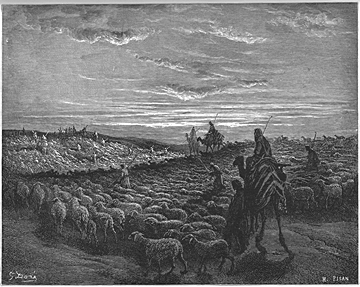Genesisy 12
1 Hoe t’Iehovà amy Avrame, Mañaveloa mb’eo; iengao ty tane’o, boak’ amo rolongo’oo naho isitaho ty anjomban-drae’o, vaho mionjona mb’an-tane hatoroko azo añe;
The Lord told Abram, “Leave your country, your relatives, your family home, and travel to the country I'm going to show you.
2 le hanoeko tariratse ra’elahy, naho ho tahieko, le ho bangoeko ty tahina’o, vaho ho fañanintsin-drehe.
I will make you the ancestor of a great nation and I will bless you. I will make sure you have a great reputation and that you are a blessing to others.
3 Ho tahieko ze mitat’azo naho hafàko ze mamatse azo; vaho ama’o ro hitahiañe ze hene hasavereña’ ty tane toy.
I will bless those who bless you; I will curse those who curse you. Everyone on earth will be blessed through you.”
4 Aa le nienga amy nitsarà’ Iehovà t’i Avrame, vaho nindreza’ i Lote. Nifitompolo taoñe lim’amby t’i Avrame te niakatse i Kharane.
So Abram left following the Lord's instructions, and Lot went with him. Abram was 75 when he left Haran.
5 Nente’ i Avrame t’i Sarae vali’e naho ty ana-drahalahi’e Lote, naho ze vara natonto’e vaho ondaty niazo’e e Kharane iabio, le nionjoñe mb’e Kanàne mb’ eo vaho nandoak’ an-tane Kanàne ao.
With him went his wife Sarai, his nephew Lot, together with all the possessions they had collected and the people that had joined them in Harran. They left for the land of Canaan. When they arrived there,
6 Niranga i taney t’i Avrame am-para’ te nitoetse e Sikeme amo hatae bei’ i Morèo. An-tane eo henane zay ty nte-Kanàne.
Abram traveled on through the country as far as a place called Shechem, stopping at the oak tree of Moreh. At that time the country was occupied by Canaanites.
7 Nisodeha amy Avrame t’Iehovà nanao ty hoe: Hatoloko amo tarira’oo ty tane toy, le teo ty nañoreña’e kitrely am’Iehovà niheo ama’ey.
The Lord appeared to Abram and said, “I'm going to give this land to your descendants.” So Abram built an altar to the Lord there because that was where the Lord appeared to him.
8 Nienga re nionjomb’am-bohitse atiñana’ i Betele añe le nañoren-kiboho, ahandrefa’e ty Betele, atiñana’e ty Aý. Teo ty nañoreña’e kitrely am’ Iehovà vaho nikanjy ty tahina’ Iehovà.
Then he moved on to the hill country east of Bethel and set up camp there. Bethel was to the west and Ai to the east. He built an altar to the Lord there and worshiped him.
9 Le mbe nionjoñe mb’amy fañaveloa’e mb’e Nègeve mb’eoy t’i Avrame.
After that he went on his way, heading towards the Negev.
10 Nimosare i taney, le nizotso mb’e Mitsraime mb’eo hey t’i Avrame nitaveañe añe ty amy fanindria’ i hasalikoañey.
But the land had been hit by famine. So Abram continued on to Egypt, planning to live there because the famine was so bad.
11 Ie fa himoak’e Mitsraime ao, le hoe re amy Sarae vali’e: Inao, apotako ty hasoa vinta’o te isaheñe.
As he approached Egypt and was about to cross the border, he said to his wife Sarai, “Look, I know what a beautiful woman you are.
12 Aa naho mahaisak’ azo o nte-Mitsraimeo le, inao: Vali’e iroa, ty ho asa’iareo, naho hañe-doza amako naho hahaen-ko velon-drehe.
When the Egyptians see you, they'll say, ‘She's his wife,’ and they'll kill me but not you!
13 Ehe, ano ty hoe rahavaveko, hanintsiñako ty ama’o hameloma’o ty fiaiko.
Tell them you're my sister so I'll be treated well because of you, and my life will be spared for your sake.”
14 Ie niavy e Mitsraime añe t’i Avrame le nioni’ o nte-Mitsraimeo ty hamozohozo’ i rakembay.
When Abram arrived in Egypt, the people there saw how beautiful Sarai was.
15 Ie niisa’ o menafoe’ i Paròo, le nitsiririe’ iareo amy Parò, vaho nasese añ’anjomba’ i Parò ao.
Pharaoh's officials also noticed and spoke positively about her to Pharaoh. So Sarai was taken to his palace to become one of his wives.
16 Nirambese’e an-talatalasaba ty ama’e t’i Avrame, vaho nanontoñe añondry naho añombe t’i Avrame naho borìke lahi’e, naho mpitoron-dahy naho ampela, naho borìke vave vaho rameva.
Pharaoh treated Abram well because of her, giving him sheep and cattle, male donkeys, male servants, female servants, female donkeys, and camels.
17 Fe nampivolevolè’ Iehovà añ’ angorosy t’i Parò naho ze añ’anjomba’e ao iaby ty amy Sarae, vali’ i Avrame.
But the Lord caused Pharaoh and the people in his palace to suffer from terrible diseases because of Sarai, Abram's wife.
18 Aa le kinanji’ i Parò t’i Avrame, le hoe ty asa’e: Ino o nanoa’o ahio. Manakore te tsy natao’o amako t’ie vali’o?
So Pharaoh ordered Abram brought to him and said, “What have you done to me? Why didn't you tell me that she was your wife?
19 Ino ty nanoa’o ty hoe, Rahavaveko? hera ho rinambeko ho valiko? Ie amy zao, ingo i vali’oy rambeso vaho akia!
Why did you say, ‘She's my sister,’ and let me take her to become one of my wives? So here's your wife! Take her and leave!”
20 Aa le nafanto’ i Parò amo mpitoro’eo ty Avrame, naho nampionjone’ iereo mb’eo rekets’ i vali’ey vaho ze hene fanaña’e.
Pharaoh ordered his guards to expel him and his wife from the country, along with everyone with them and all their possessions.





















